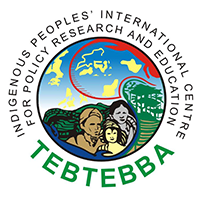DAYALOGO: Indigenous Navigator supports indigenous peoples dialogues with government agencies
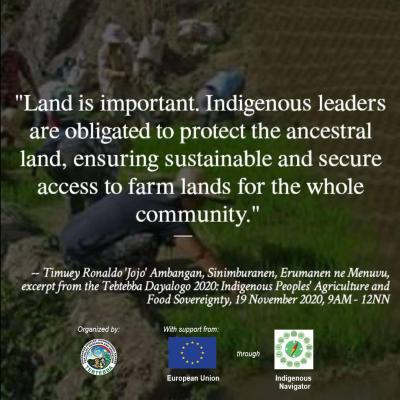
The event is the first part of the planned Dayalogo series facilitated by Tebtebba with the support of the European Union through the Indigenous Navigator Initiative.
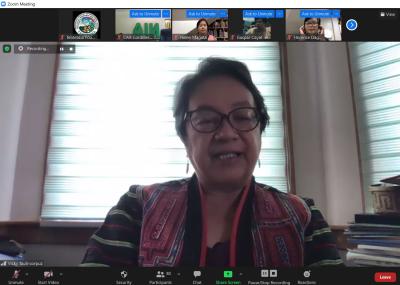
We have always endeavored to facilitate dialogues between indigenous peoples and government agencies because we firmly believe that only through constructive dialogue that issues being raised by our own indigenous peoples can be resolved, but this also allows the government agencies to share more broadly what they are doing in relation to helping the welfare and well-being and, of course, the rights of indigenous peoples.
The first Dayalogo which was entitled Indigenous Peoples: Agriculture and Food Sovereignty, was conducted on 19 November 2020.
The event is the first part of the planned Dayalogo series facilitated by Tebtebba with the support of the European Union through the Indigenous Navigator Initiative. In line with the Indigenous peoples' sustainable, self-determined development (IPSSDD), the United Nations Declaration on the Rights of Indigenous Peoples, and the Indigenous Peoples Rights’ Act (IPRA) of 1997, the gathering aims to contribute to the achievement of the United Nations’ 2030 Agenda on Sustainable Development Goals (SDGs).
In the said virtual dialogue, around 89 participants were present composed of indigenous community leaders from all over the Philippines and several officials and staff from the Department of Agriculture (DA), Department of Agrarian Reform (DAR), National Irrigation Administration (NIA), and the National Commission on Indigenous Peoples (NCIP).
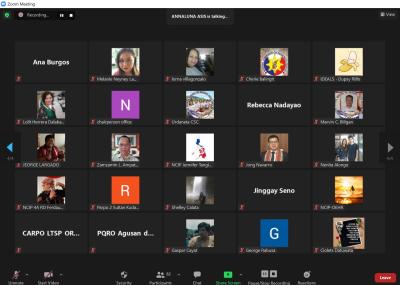
NCIP CAR and Region I Commissioner Gaspar ‘Gary’ Cayat stresses, “We are here to work with you, side by side, and I want that we should not be misinterpreted as mere participants… We have our genuine intention to help indigenous peoples address their concerns… We will closely work with you and we are happy that we were invited in this forum,” as he provides a brief message before the different presentations from the participants.
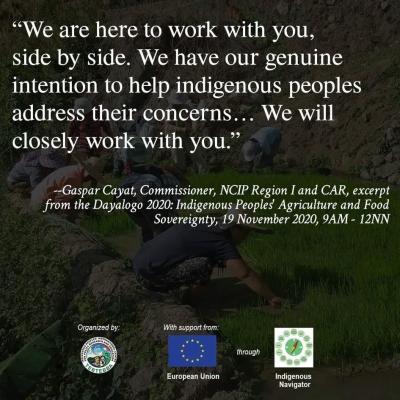
Different issues concerning the Indigenous Peoples in select regions of the Philippines were discussed. Indigenous leader representatives from Luzon, Visayas and Mindanao were requested to present their specific problems, covering a total of four topic clusters.
CLOA Within Ancestral Domains
The first topic cluster delved on the distribution of Certificate of Land Ownership Award (CLOA) for tenanted farms within ancestral domains.
“Malinaw po sa ‘min ang nasasaad sa IPRA at alam po namin ang mga karapatan namin… May 4 bundles of rights kami doon, kasama ang karapatan sa ‘ancestral domain’… May proteksyon kami sa ancestral domain…,”
["It is clear to us what has been stated in the IPRA and we know our rights… We have 4 bundles of rights concerning our ‘ancestral domain’… We are entitled to the protection of our ancestral domain..."]
asserts Manobo Lumadnong Panaghiusa (MALUPA) representative, Datu Berino Sumin Jr., as he narrates the current situation of the Tinananen in Arakan, North Cotabato as they grapple with the confusion brought about by the distribution of CLOAs despite them awaiting the issuance of the already approved 1998 Certificate of Ancestral Domain Title (CADT), a document that acknowledges the ownership of indigenous peoples over their identified territories.
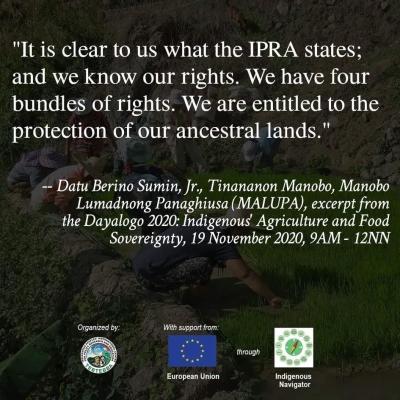
Representing Erunamen ne Menuvu Kamal, Timuey Ronaldo ‘Jojo’ Ambangan mentions the same situation in Carmen, Cotabato where titling and identification of so-called agrarian beneficiaries is being conducted over several parcels of land within their designated ancestral domain despite the fact that an application for CADT is on-going. He requests for help regarding the matter as he stresses the fact that these inglorious activities are being done by non-indigenous peoples who do not rightly own those lands.
Similarly, Panaghiusa alang sa Kaugalingnan ug Kalingkawasan (PASAKK) representative Becky Barrios posits the ongoing titling of ancestral lands in Bunawan, Agusan del Sur.
“Problema namin ay merong mga nagpatitulo via DAR. Doon sa mga nakatanggap, may mga titulo silang hawak pero hindi nila alam kung saan ang lupa. Meron din nakita na ang lupain ngunit iba ang nagsasaka. Ang mga lupain ay nakapaloob sa ancestral domain. Paano masisiguro ng mga magsasaka na sa kanila ang lupa na kanilang sinasaka at na sa kanila ang titulo ng lupa? Walang mga katutubong nabigyan ng titulo. Karamihan ay mga tagalabas. Kailangan naming maipaabot ito para matulungan ang mga katutubo,”
["Our problem is that there are some who obtained land titles via DAR. For those who were able to receive titles, they hold these documents but they do not know where these lands are located. There are also lands that are being farmed by others. These lands are within the ancestral domain. How can farmers make sure that the lands they are cultivating are theirs? There are no indigenous peoples provided with titles. Most of those given are outsiders. We need to bring this issue out so that indigenous peoples are helped."]
Barrios points out.
Samahan ng mga Katutubong Agta/Dumagat at Remontado na Ipinagtatango ang Lupaing Ninuno (SAGIBIN-LN) President Marcelino Tina, via video patch, also presents the need to review and cancel CLOA distribution in General Nakar, Quezon since a CADT was already awarded to the Agta and Remondato indigenous peoples in the said area through NCIP. He mentions that the CADT is unfortunately not fully recognized by DENR, DAR, and DA—and that a JAO (Joint Agreement Order) must be created among these NGAs to fully acknowledge the said CADT. Tina also points out the negative impact of the proposed Kaliwa Dam on the indigenous communities in the area.
Timuay Justice and Governance (TJG) Titay Bleyen (Assistant to the Supreme Chieftain) Santos Unsad points out the need for the Bangsamoro government, through the Intergovernmental Relations Body (IGRB), to address issues in the Bangsamoro Autonomous Region of Muslim Mindanao as well.
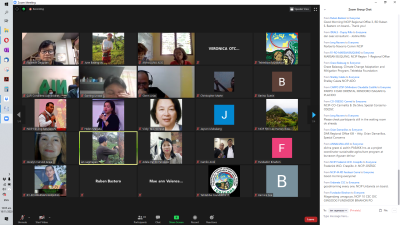
Access to Services and Programs
The second topic cluster covers indigenous peoples’ access to government services and programs. Barrios mentions that many members of PASAKK do not have complete access to seeds that are supposedly distributed by the DA. Some of them, she mentions, are provided with these seeds in exchange for a 500PhP fee.
Barrios also shares that indigenous peoples in her area are not able to avail of bank loans as massive prerequisites get required. One of these requirements is a land title (that acts as a collateral when obtaining a bank loan). She stresses that such a requisite cannot be provided by indigenous peoples since their lands are within the communal ancestral domain. She hopes, however, that indigenous organizations (IPOs) do get recognized as legitimate conveyors so that small-time farmers get provided with more livelihood opportunities.
Pidlisan Tribe Organization (PITO) representative, Ian Sagmayao of Sagada, thanks the DA for the irrigation help they received. However, he mentions the need for further assistance in the maintenance of the 9.2-kilometer irrigation facility used by their community.
TJG representative, Timuay Labi (Supreme Chieftain) Leticio Datuwata, calls for the necessity of various NGAs and line agencies to aid indigenous peoples as they grapple with food insecurity during this COVID-19 pandemic. “Basis dapat ang IPRA—dapat kilalanin,” [The IPRA must be the basis—it must be recognized.] he adds as he points out the different atrocities done against indigenous peoples, particularly those concerning their ancestral domains.
Florence Daguitan, Tebtebba’s coordinator for IPBP (Indigenous Peoples’ Biodiversity Program), spoke about the issues raised by Naundep ni Napahnuan ni Kalanguya (NNK), Indigenous farmers Association of Guinaang Pasil, Inc (IFAGPI), and Inapinan Farmers' Organization which are IPOs based in Ifugao, Kalinga, and Mountain Province. She stresses the need to support the combination of “traditional knowledge and modern technologies in mapping ancestral domains for comprehensive land use planning.” Likewise, Daguitan mentions the necessity providing adequate indigenous peoples’ access to the different government programs offered.
Indigenous Knowledge Systems and Practices (IKSP)
The third topic cluster revolved on indigenous knowledge systems and practices (IKSP).
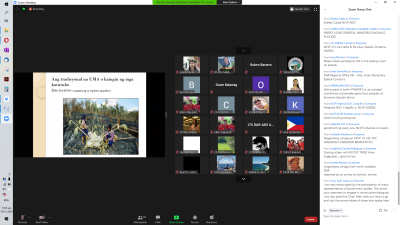
NATRIPAL President John Mart Salunday presents the age-old practice of “pag-uuma” (swidden farming)—a tradition that many consider as environmentally destructive. He goes on to enlist—and explain—the different aspects of the said indigenous farming procedure. Salunday ends his presentation with an appeal for a DENR (Department of Environment and Natural Resources) and NCIP Joint Memorandum Circular that recognizes ‘kaingin’ (swidden farming) and rotational cropping as a legitimate and environmentally sustainable practice. He stresses that RA 9003, the Ecological Solid Waste Management Act of 2000, contradicts indigenous culture.
Titay Santing introduces the Téduray and Lambangian practice of ‘sulagad’—an indigenous livelihood system that recognizes the belief that anything found within the ancestral domain can be used. He mentions that, through this system, Téduray and Lambangian people refrain from using commercial fertilizers. Instead, the fertility of the soil depends on the decaying wood and leaves found in the land. He adds that the ancestral land provides relief from hunger—it is a “food repository or granary.”
“Kung kailangan mo ay kunin mo. Pwede rin maging gamot sa sakit at pampalakas sa katawan. Ang mga ito ay pamana ng mga ninuno at bigay ng Diyos,”
["You only take what you need. You can even use them as medicine and to strengthen the body. They are our inheritance from the ancestors and are also God-given."]
Titay Santing adds.
He states that the practice of ‘sulagad’ provides the Téduray and Lambangian with their staple food. Nevertheless, he also mentions the disappearing support for the practice of this indigenous system. He explains the negative impacts of modernization, technology, climate change, displacement, and even some government policies and programs to the preservation and perpetuation of this age-old practice. Titay Santing appeals for support in the revival of the ‘sulagad’ system with the aid of appropriate government programs and policies.
Agri-business Within Ancestral Lands
The fourth topic cluster discusses agri-business operations within ancestral domains. Salunday and Ambangan mention the development and maintenance of oil palm plantations within Palawan and Aroman, respectively. They both mention the violations to the right to free, prior and informed consent (FPIC) of indigenous peoples prior to establishments of these businesses within their ancestral lands.
Salunday specifies Bataraza, Rizal, Brook’s Point, Española, and Quezon as places in Palawan that were largely damaged due to the creation of these oil palm plantations in these localities. “Maraming kahoy ang naputol sa mga lupaing ninuno kasama na ang mga mangrove areas,” ["Numerous trees were cut in the ancestral lands including those in the mangrove areas."] mentions Salunday. He explains that these plantations cause huge damage to Palawan’s environment and biodiversity. Salunday mentions, however, that NATRIPAL already prepared a petition requesting for a national inquiry with the aid of the CHR (Commission on Human Rights) to halt the operation of these oil palm plantations in Palawan.
Ambangan reiterates the significance of having a copy of a CADT. He stresses on the necessity of obtaining the said document as “that piece of paper is a morale booster for the community.”
NGA Leaders Respond
Accommodating the issues presented by the different indigenous organization representatives, the NGA personnel present during the dialogue provided responses, as well.
DA Undersecretary Zamzamin Ampatuan, via his colleague Camilo Andi Jr., focuses on the CLOA provision that overlaps the ancestral domain of indigenous peoples in Carmen, Cotabato. He says that the DA will visit the location and strive to solve this problem by 2021.
NIA representative acknowledges the irrigation problem in Sagada, previously presented by PITO representative Ian Sagmayao. He says that their office will instruct the provincial head of NIA-Mountain Province regarding the validation of the 9.2-kilometer irrigation system and of other similar areas in the region. “NIA is your partner in irrigation development… and we are here, full support, whatever irrigation services [we can give to our farmers and irrigators, especially to our indigenous peoples],” adds the NIA officer.
“It is good that indigenous peoples themselves are voicing these concerns,” NCIP Commissioner Cayat of Region I and CAR responds, referring to the overlaps of CLOA and ancestral domains in Cotabato. He says that other colleagues from the national government agencies needed to know that there is indeed a problem at the local level. This is why concerned government offices must discuss this issue seriously. “Huwag na galawin kapag parte ng ancestral domain,” ["If it’s part of the ancestral domain, it shouldn’t be touched"].
he continues.
Regarding the issues presented with regards to the inability to access government services and programs, he mentions that their office keeps lobbying for more IP-focused services. “Kung ayaw nila ibigay sa NCIP, they should give it to DSWD or sa nakakatulong talaga para directly maibigay sa ating mga IP brothers and sisters na talagang nangangailangan,” ["If they don’t like to give it through the NCIP, they should give it to [the] DSWD instead, so that services go directly to our IP brothers and sisters who really need the help"]. Cayat points out.
He reiterates the need “to respect, protect, and promote the interests of the indigenous peoples of the Philippines.” Referring to the issues concerning indigenous communities in Tinoc, Ifugao and Pasil, Kalinga, Cayat posits that their office will be “happy to coordinate” with the communities affected to solve the problems there.
“Kasi may kanya-kanyang mandato ‘no (Because there are individual mandates), so there’s a conflict of interest... There are points of conflict with other agencies or contests of mandates but there are also areas of cooperation. For instance, malaki ang usapin ngayon sa tulungan ng DA and NCIP sa food security (there is a huge discussion now about the joint efforts of DA and NCIP for food security),” NCIP Commissioner Norberto ‘Jong’ Navarro adds as he announces the PhP150 Million joint project that is being processed in support of farmers. Consequently, he mentions the upcoming NCIP event that will focus on the “protection and promotion of indigenous peoples’ rights in BARMM, plus the issue of jurisdiction and local legislation of IP rights.”
In response to Kamal’s earlier Aroman, Carmen, Cotabato presentation, DAR’s representative Emelita Mayol explains that an initial validation and segregation survey was conducted in March 2020, based on Executive Order 75 (EO 75) stating that the land used by BPI (Bank of Philippine Islands) is government-owned. Likewise, Mayol explains that violations of the said EO and JAO were committed by various government departments. She adds that DAR acknowledges the area claimed by indigenous peoples in Aroman and that, at present, no portion of the disputed domain has been given away yet since the said validation and survey is still on-going.
“Kailangan talagang mag-usap ang mga concerned government offices [tungkol sa] nararamdaman nilang confusion sa grounds. So, it’s a challenge for all of us in government [kung] paano natin ayusin ito para maramdaman… ng mga katutubo, who are our final clients, kung ano talaga ang itinutulong ng gobyerno,”
[There is really a need for all concerned government offices to discuss the confusion felt in the grounds. So, it’s a challenge for all of us in government to fix this predicament and let the indigenous peoples, who are our final clients, to feel the help provided by the state].
Cayat points out.
NCIP Central Mindanao Commissioner Jennifer Sibug-Las posits that the issues raised by indigenous leaders in North Cotabato, particularly that of land conflict, were already reported to their office. She continues that their office engaged all the concerned government agencies, coming up with resolutions for the said problems. Sibug-Las thanks Tebtebba for the opportunity for all the present NGA representatives to witness the presentations made by the different community leaders so that the societal divide experienced by indigenous peoples gets solved.
Protection and Respect of Indigenous Rights
“Ito talaga ang tanging paraan para tayo ay magkaroon ang pagkakaisa tungo sa pag-protect at pag-respect ng katutubong mamamayan,” ["This is really the only way for us to be united towards the protection and respect of the indigenous peoples"] explains Tauli-Corpuz as she provides the closing remarks for the dialogue. Citing Cayat, she reiterates that we aren’t just participants but partners in the indigenous peoples’ advocacy. She stresses the need to work as one for the fulfillment of IPRA—to recognize that indigenous peoples have their own traditional knowledge systems that must be acknowledged and supported. She adds that Tebtebba will continue to facilitate these series of dialogues but that they must also be done at the local, provincial, and regional levels.
POSTSCRIPT:
Concrete actions had been reported by our partners from the concerned line agencies.
The general feeling of the representatives from the indigenous communities is that for the first time, the line agencies have heard them.
Datu Boy Sumin of MALUPA claims the Dayalogo was the first time the DA, DAR, NIA and NCIP heard and took action on problems related to their ancestral domain which they had been reporting for the past years. The regional director of DAR and NCIP promised to visit the Manobo Tinananon highest governing body in Arakan to discuss ancestral domain issues. PITO president Osenio reported that the provincial office of NIA-Mountain Province visted them the day after the Dayalogo asking if they have reported to the regional NIA office but Osenio informed them that PITO reported their request directly to the NIA head office. They scheduled a validation visit to check on the irrigation systems being used by the farmers.

Timuey Jojo Ambangan reports that while the Dayalogo was on-going, he was receiving text messages from Undersecretary of the DA Zamzamin Ampatuan setting a visit to the research center in early 2021. This immediate response shows the importance of direct engagement of indigenous communities with the national offices of the government line agencies. For the NCIP, Kamal has lined up a series of activities including a workshop assessment on the situation of the ancestral domain using the agencies tool which will be used to validate the results of the IN community questionnaire. They use the results of these tools to further engage with NCIP for which they had an earlier dialogue with the Chair in September where they presented and submitted their reprots.
For Timuey Ambangan, the Dayalogo was an opportunity to raise the awareness of the other line agencies on indigenous peoples … “ah, so there are indigenous peoples!” and the results of these are inputs into local dialogues.
For Pangulo Tena of SAGIBIN-LN, NCIP Chair Capuyan had a meeting with them the following day on the issues they raised.
NATRIPAL, PASAKK and TJG have not yet received any response from the offices of relevant agencies but they are looking forward to following-through the local offices, and continue engaging the other government offices.
